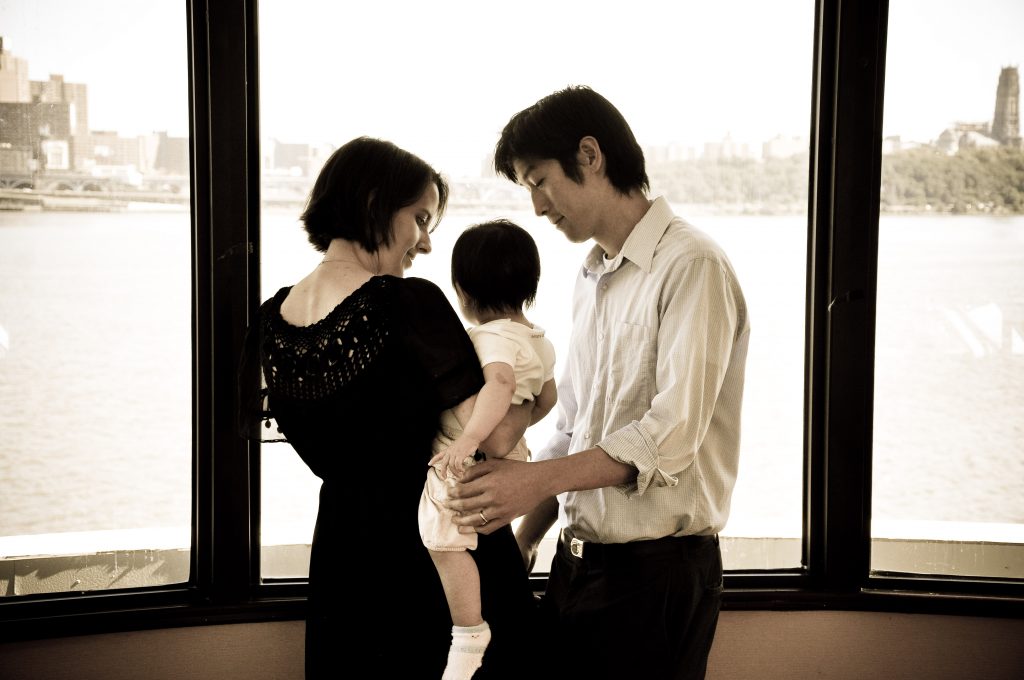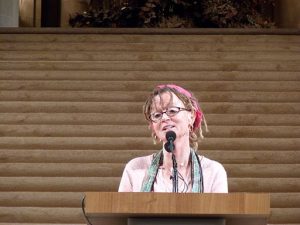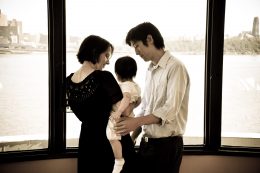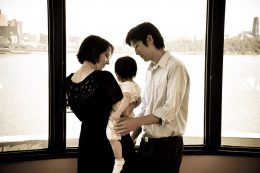
Julia Cho with her husband and daughter (Julia Cho)
I swore to myself that I wouldn’t do it. “I will not tell her ‘the story,” I’d thought. I was waiting in line at a writer’s conference to have my book signed by the keynote speaker, Anne Lamott. The line was moving quickly, and I was thinking about what to say, surprised by my sudden self-consciousness.
I’ve long admired Lamott’s writing voice, the way she weaves together the lighter moments and really hard things in life with grace. I’ve chuckled out loud at her honesty and, often, her self-deprecating humor. And as is the case with any good writer with a strong voice, her readers, including me, come to feel that we know her. As a widowed parent raising an only child alone after my husband died seven years ago, I also felt a connection with her because she had raised a son on her own.
Before long, I was at the front of the line. I handed her my dog-eared copy of her book. And then I heard myself saying it: “My husband died when my daughter was a baby, so you are inspiring to me in that way too…” I said something like that, but not as articulate.
I can’t even remember her response — maybe it was a soft smile of understanding and a thank you. Or maybe “I’m sorry.” And then I walked away with my signed book feeling dumbstruck. I’d done it again.

Anne Lamott (Wikimedia Commons)
At the four-day conference at Princeton at which I met Lamott, I’d been ‘telling the story’ quite a bit, because my current writing project is a memoir about my husband’s sudden death when I was 34 and my daughter was 21 months old.
In the beginning, those of us mourning the loss of a loved one tell the story over and over again because we’re trying to make sense of the new narrative written into our lives. We tell it because it is the most surreal, unbelievable thing that has ever happened to us.
In my case, my husband had drowned in Lake Geneva, Switzerland on his day off while touring as a rock cellist with singer Regina Spektor. It would take a long time and many tellings for that story to even begin to sink in.
I can remember one therapist saying to me, right after my husband had drowned, “It’s like you want everyone at Whole Foods to know that you just lost your husband,” to which I didn’t hesitate to answer, “Yes, I totally do!”
That was seven years ago, though, when my widowhood was still a complete shock to me. Even though the story feels no less surreal today, my identity today isn’t primarily as a “young widow.” I’m a mother, a writer, and a single woman. I don’t wish to be known primarily by my wounds, and I definitely don’t want the looks of sympathy or awkward surprise from others. In my forties now, I understand that everyone will go through hard things, and I don’t see myself as particularly unique.
So I was frustrated and a bit curious as to why I told Lamott about my husband’s death at the recent conference. Why did it matter that she know? Had I regressed in my grieving process after so many years?
There are many metaphors offered to describe grief because it’s so hard to say what it is — all we can do is say what it’s like. My personal favorite is the gaping hole in one’s life, like a hole in the earth. We plant flowers around the hole, the metaphor goes, but it’s always there. I’ve grown all kinds of flowers around mine, including a daughter who’s now nine years old. Mostly I live around its perimeter, but in the moments or days when I stumble into that hole, it is, surprisingly, just as deep. Through her writing, I’ve known Lamott as someone with deep wounds who walks around the perimeter as well, someone who plants flowers, teaches Sunday school, and loves dogs.
Lamott has said that the most powerful sermon in the world is just two words: “Me too.” It’s taken me a year to figure it out, but I think I understand now why I told her my story. It wasn’t to elicit sympathy. It was my way of saying, “Me too.” It was a moment to acknowledge the hole. A nod, kind of like the look tired young mothers give each other as they chase their children that says, “This is really hard, right?”
“Pretending that things are nicely boxed up and put away robs us of great riches,” Lamott has written about loss. Even though it’s mostly hidden now as I go through my daily life, the truth is, that hole is forever a part of my story, even the new ones I am writing. How could it not be?
Julia Cho blogs at Studies in Hope. On her widely read blog, Dear Audrey, she chronicled her grief process after the sudden death of her husband. Her writing has been published in The New York Times, Elephant Journal, Literary Mama, and others.









